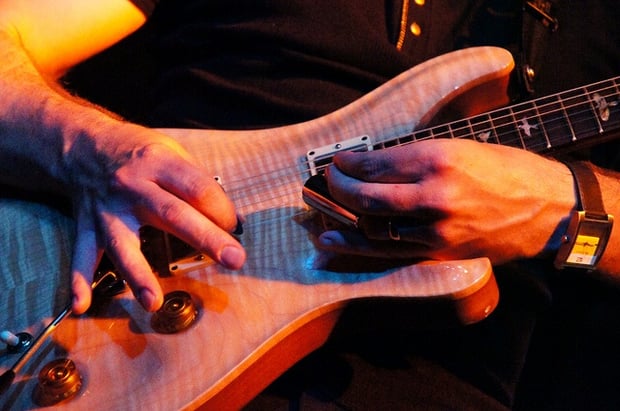 Image via flickr.com
Image via flickr.com
Slide guitar is one of the oldest sounds out there. However, gifted guitarists can still come up with fresh musical takes on the method. If you've never tried to play this way and are looking for some new sounds to experiment with, stop in at your local music store and buy a slide. They're usually inexpensive and come in enough varieties to fit all fingers. If you're feeling handy, you can make your own. Regardless of whether you're steeped in Delta Blues or have never heard a slide before, here's why all guitarists should give slide guitar a try at least once.
1. It'll help you learn other tunings
Slide guitar can be played in any tuning. However, many songs that use a slide are in one of the open tunings. The three most common open tunings for slide guitar are G, D, and E. If you didn't know, in each of the open tunings, all six strings are tuned so that they make a major chord when strummed. The slide provides a convenient way to play all six strings on different frets to make other major chords. If you aren't accustomed to playing outside of standard tuning, playing slide is a great way to get a good grasp on them.
2. It'll help your fingerpicking
If you've had difficulty learning fingerpicking, slide is a great way to help you focus on it. You can play slide guitar in any tuning and with any type of pick, but using an open tuning and your fingers will help you get the feel for syncopated bass and melody fingerstyle more easily. Since you don't need to focus on your fretting hand as much with slide guitar, it's easier to focus on your picking. Your technique will improve rapidly with practice. If you don't use a pick, you'll get a soft and warm sound out of the instrument. Buy some finger picks for a few dollars and get used to playing with them. With a little practice, you can have your guitar roaring at the audience, very different from the sensitive accompaniment that most audiences expect out of an acoustic guitar.
3. The slide works well on both electric and acoustic
You've probably heard the bluesy snarl of a slide over an electric guitar and the quiet, anguished moan of one over an acoustic. However, both instruments offer a wide variety of sounds with a slide. Duane Allman of the Allman Brothers creates a clean, melting, honey sound while sliding over an electric. And when Leo Kottke slides over a 12-string acoustic, it calls to mind a rusted runaway train. Whether you prefer one to the other or use both, learning to play slide will add a menagerie of sounds to your repertoire that no serious guitarist should pass up.
4. The slide is more expressive
The concept of a slide over a string is incalculably old and is present in the music of many different cultures. The first slide was likely a bone over a gut string. The reason for this ubiquity is no doubt the slide method's aptitude for capturing the subtle inflections of the human voice. Playing slide gives a guitarist a continuous range of notes to play over, rather than being restricted to the half steps of frets. It has all the expression of a fretless bass (or guitar), but has a feeling to it that I can only describe as liquid. That liquid can feel like anything, from cold water going down your back to submerging yourself slowly in a bubbling hot tub. It's a difficult dichotomy to express. The only way to fully understand what I'm talking about is to give some slide guitar music a listen.
5. You'll get better at phrasing
The expressiveness and continuity of the slide comes at the expense of the speed and precision that frets offer. Playing lead with a slide will require you to learn to take your time and choose your notes carefully. This is an approach and skill that every guitarist should try to learn. There's nothing that engages the ears and emotions of your audience like a solo that swells from a short, quiet phrase into a thunderous, galloping climax. Of course, building up to that sort of skill takes time and practice (but what kind of musician is afraid of that?). Regardless of whether you stick to slide or not, the things that you learn about phrasing will translate to other styles of playing as well.
Like all styles of music, slide guitar is a tradition that's best carried on with adaptation. Feel free to start by mimicking someone else's sound; everyone does. If you pool enough influences, you may emerge with your own adaptation of slide, and you, too, can be a part of the storied lineage of slide players.
Matthew Wendler is a blogger and multi-instrumentalist from New Jersey. He specializes in guitar, bass guitar, and bagpipes, and is passionate about writing both professionally and for enjoyment. His personal blog can be followed on Twitter at @ymiatvmi.


